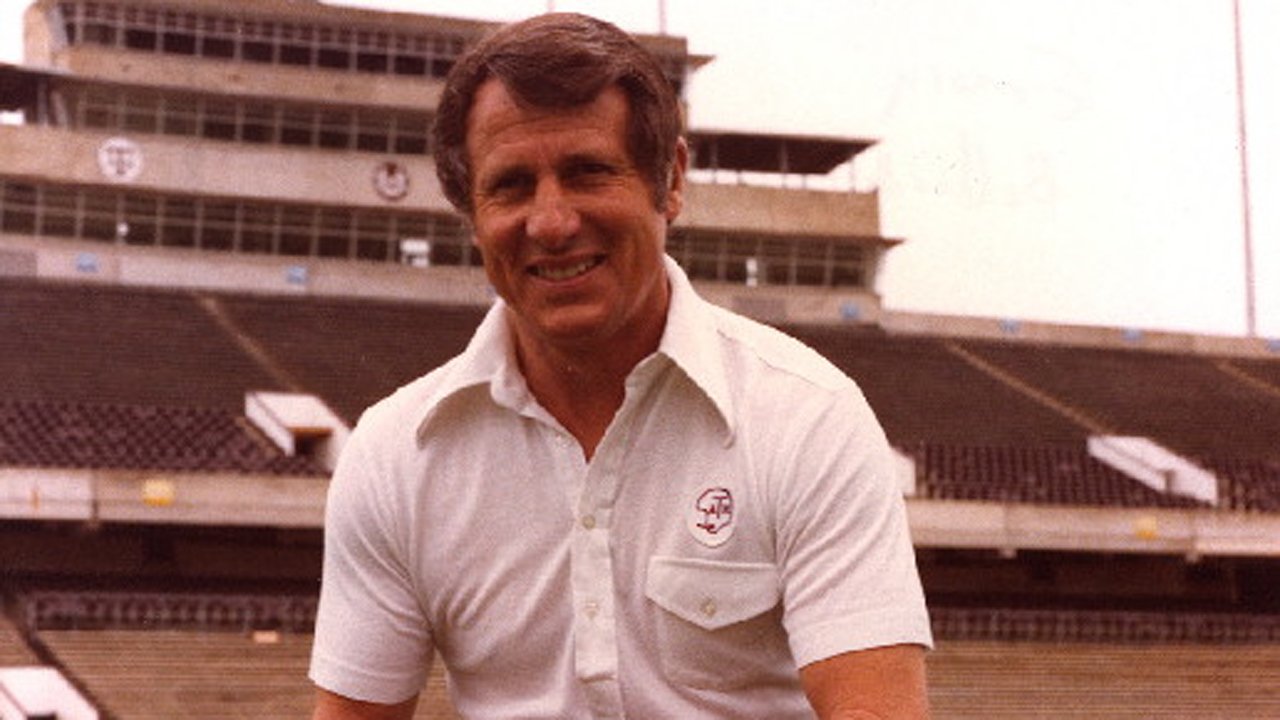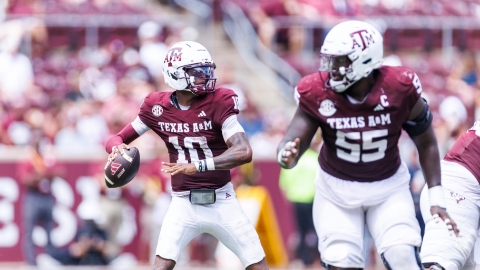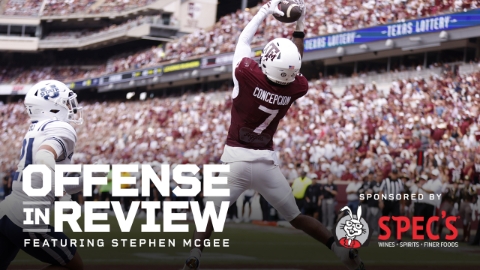
Photo by Texas A&M Media Relations
Failed to load video information.
Legendary former Texas A&M Football coach Emory Bellard passed away in the early morning of February 10, 2011 after a long and difficult battle with Lou Gehrig's Disease (ALS). He was 83-years-old. The following is a written tribute to one of the all-time great football figures in Texas A&M history and one of the best people to ever be involved in the game of football.
He was a great coach. Innovative, imaginative, influential, inspirational. Just a few of the ways to describe Emory Bellard during his 43 years on the sidelines, at both the high school and collegiate level.
The author of the Wishbone offense, Bellard changed the game and impacted the entire college football landscape for decades. It did not take long before nearly every team in college football started running some variation of the Wishbone. Late in Bellard's life, he continued to draw up new and innovative plays in his notebook … and yes, those plays were always in true Wishbone formation.
Bellard graced Aggieland with his presence for six-and-a-half seasons, starting in 1972 and ending halfway through the '78 campaign, when he shockingly decided to resign his post six games into the season. During that span, Coach Bellard won 48 games, including a share of the Southwest Conference Championship in 1975. That '75 group may be the single-greatest team ever to walk onto the Kyle Field turf and play in front of the mighty 12th Man.
Bellard was THE most influential figure in bringing African American athletes to Texas A&M. When Bellard arrived in Aggieland, there was only one black football player on scholarship. In his first recruiting class, he added nine black prospects to the squad. It was a giant leap forward and it changed the culture of Texas A&M University and Aggie Football for the better … both on and off the field.
Within a couple of years, Bellard had added names like Pat Thomas, Tank Marshall, Bubba Bean, Lester Hayes and Robert "Stonewall" Jackson to the squad, ushering in a new era in Texas Aggie Football. And in 1975, they teamed with greats such as Ed Simonini and Garth TenNapel to form what is considered by many to be the best team in school history. The Aggies went 10-0 to start the year before losing their last two games. They finished as co-champions of the SWC and, while they were not able to win the "big prize" as many expected they would, their prowess on the field that season will never be forgotten by those who were fortunate enough to watch them play.
On the defensive side of the ball, that group was the Wrecking Crew before the Wrecking Crew was the Wrecking Crew. And to a man, the players on that team give all of the credit to Coach Bellard for recruiting them to Aggieland and, with the help of top-flight assistants such as Melvin Robertson and R.C. Slocum, developing them into great people and great football players.
At a recent tribute banquet for Emory Bellard -- one of those rare opportunities to honor a man while he's still on Earth and in attendance -- many legendary former players and fellow Southwest Conference coaches descended upon the Zone Club at Kyle Field for a chance to shake Coach Bellard's hand and feel the warmth of his ear-to-ear smile one last time.
I got the chance to attend that special event and to speak with many of those college football greats about the life and legacy of the one and only Emory Bellard.
"Emory's a very special individual, not just as a coach but as a person," said Tank Marshall, who played under Coach Bellard from 1973-76. "He took not just myself, but many other guys and pretty much took us from boys to men as I like to call it. When we came in, we didn't have a sense of responsibility to a good extent, other than what our mothers and fathers gave us, or grandparents. But the extension of a father, if you will … that's the position that he took up.
"As a head coach, Emory really took a lot of the guys and made them feel comfortable and would guide them in the right path and direction," Marshall added. "I still am and will always be fond of the guy. I love him to death. And the thing is, there are a lot of guys here that can voice those same sentiments as far as their feelings towards Emory and all he's done to help them develop into the men that we are today."
Bill Yeoman played one season at Texas A&M (1945) before transferring to Army. He became a legendary coach at the University of Houston from 1962-86 and matched up three times against Bellard and the Aggies … holding a 2-1 record over A&M from 1976-78.
"He loved the kids and he loved the game," Yeoman said. "There was a serious, serious commitment to him and I thought that was as descriptive of what he was as anything I'd seen.
"The first time I knew Emory or knew of Emory was when he was a high school coach out in West Texas," Yeoman added. "I had one of his youngsters who was a great quarterback for us and had won the state title for [Bellard]. I'll tell you, if you're a high school coach in West Texas, you are a football coach … no question about it. Because the people in the city or town will not tolerate somebody who doesn't know what they're doing. As he came along, he went to the University of Texas and did well as an assistant. I'm sure everybody had a hand in coaching that Texas team, but he had a pretty serious hand in it and they won a National Championship. Then he went to A&M and we competed against him while he was there. He had great people there and he just did a really good job."
William Taylor "Spike" Dykes is most known for the 14 seasons he spent in Lubbock as head coach of the Texas Tech Red Raiders, from 1986-99. But Dykes' 41 years in coaching saw him make eight stops through the high school ranks on his way to Tech. Along the way, he was given two opportunities to work under and learn from Coach Bellard … two-years as defensive coordinator at San Angelo Central High School (1962-63) and one season as an assistant at Mississippi State (1979).
"I worked for Emory back in my formative years," Dykes said. "I cannot tell you how much I learned from him, and how much I love him, and how much he's meant to me and my family. He's such a unique human being. He started out in a Class A school, and he ended up with a National Championship as an assistant coach at Texas. Then, he came to A&M and did wonders. He's just a great man. He personifies what it's all about … he really does."
Frank Broyles is a legendary figure in the State of Arkansas. He spent 19 seasons as head coach of the Arkansas Razorbacks, from 1958-76, and served as athletics director from 1974-2007. Bellard and Broyles met five times on the gridiron, with A&M winning three of those matchups.
"Emory Bellard was a winner," Broyles said. "We admire and respect him. Every level he worked at, he was a consistent winner. Whatever he did, he changed things around for the better and helped many a young person."
Grant Teaff roamed the Baylor sidelines as head coach from 1972-92. He and Coach Bellard got hired the same year and mated up seven times in the series between the Aggies and Bears. Bellard's Aggies were 5-2 in those games.
"Emory and I have known each other since the late 1950s," Teaff said. "When I got out of college, he was already a successful football coach in high school. I really admired him. He was really professional and we've been friends all these years. Our careers sort of paralleled. I was an assistant at Texas Tech when he was an assistant at Texas. Then he was head coach at A&M while I was head coach at Baylor at the same time. We competed against each other but we're really good friends."
And there there is R.C. Slocum and Jackie Sherrill. Two of the all-time legends in Texas A&M Football history, and two men that admire Coach Emory Bellard a great deal.
Slocum gives Bellard all of the credit for what he was able to accomplish in his 40-year association with Aggie Football. Long before Coach Slocum's 123-win career as A&M head coach, which spanned 14 seasons, he was a young, hungry assistant that just wanted a chance. Emory Bellard gave him that chance.
"Emory Bellard is the reason why I was ever at A&M," Slocum said. "He hired me as a very young coach. I came and worked for and learned from him. He was a great mentor for a young football coach and I learned so much from him in every way. [I learned] about the game of football and the game of life. [I learned] about how to treat players ... the list goes on and on."
Sherrill, who led the Aggies back to prominence from 1982-88, never coached with or against Bellard, but has gotten to know him really well over the years. And the idea of hosting a tribute dinner for Coach Bellard was the brainchild of Sherrill and several members of his 12th Man Kickoff Team Foundation.
"The thing about Emory is that there are so many people and so many coaches that are where they are today because of opportunities that Emory gave them," Sherrill said. "Barry Switzer couldn't be here, but he said, 'Make sure you tell Emory that I would not have been the coach that I was without his help.' When Emory Ballard came along with the Wishbone, it changed the game. It changed the game completely, as we saw it before.
"We all know about ALS - there's no cure," Sherrill added. "We know anybody who contacts ALS has limited time. The thing that's really been different to me is that I've had to opportunity to go and visit, and spend time talking about things that he won't share with other people. But his attitude about the whole thing has been eye-opening and amazing for me."
Emory Bellard will be missed by many people, but his legacy in the game of football -- and the game of life -- will live on forever.
Never miss the latest news from TexAgs!
Join our free email list




